Kelly Reichardt’s quiet, tensely painful drama Wendy and Lucy is scheduled to leave the Criterion Channel at the end of the month. Since we at The Solute are, in the main, enthusiastic Reichardt fans, most of you have probably already seen this, but if you haven’t, or even if you’re due a rewatch, I would urge you to check it out before it vanishes.
The film is a terrific showcase for Michelle Williams–who can, frankly, never have enough showcases. She plays Wendy Carroll, a young woman of restrained desperation, partway through a slow trek to Alaska: she started in Muncie, IN and is now in Oregon. We don’t see the beginning of her journey and we don’t see the end; what we get is a snapshot of a breaking point, a handful of days in a small town where her life dramatically changes. Wendy is living at the very edge of her resources. She needs to get to Alaska to get work at a cannery–“I’ve heard they need people,” she says–and her cash, kept in a hidden money belt, is dwindling. She keeps a notebook carefully charting out actual and anticipated expenses. And when she runs out of food for her beloved dog Lucy, she decides to save what money she can by shoplifting a couple of cans of dog food. And then everything goes to shit.
Her car’s broken down. She has to spend part of the day in jail and lose more of her money to a fine. And when she gets back to the grocery store, Lucy is gone.
Poverty means having no margin of error, and Reichardt dramatizes that here without ever making Wendy more of a political point than a character. Williams plays her with a barely self-contained sense of anger and terror, neither of which she can generally risk openly admitting to. It’s a raw, unglamorous, impressive performance. Wendy and her need are the centerpiece of the film, and many of the character interactions are about how other people will respond to that need, especially when it inconveniences them.
The least sympathetic is a self-righteous teenage employee of the market where she shoplifts–the cross around his neck indicates that he’s a practicing Christian, but clearly, for him, that practice is more about virtuously upholding what he thinks of as the righteous social order and not, say, having compassion for suffering. There’s something especially grotesque and clear-sighted–on Reichardt’s part–in the way he has less skin in the game than anyone; he has no investment in the system, he would lose nothing by being kinder to Wendy. He just wants to be right, and righteous, in comparison to her, and that gratuitous rightness makes him cruel. It’s telling that he neither does anything to take care of Lucy, once he ensures Wendy’s arrest, nor helps her look for her dog when he sees her return later. His only interest is punitive.
In contrast to him are a security guard, who has to uphold the rules to keep his own job but who is gentle and friendly and helpful with Wendy outside of that, and a mechanic, who has independence enough to at least be able to cut his fees down when he sees the trouble she’s in. These spots of kindness–and one or two spots of humor–are necessary to get you through the movie, which would otherwise be too bleak to bear. As it is, it’s hard enough to watch Wendy’s already small life close down even further, to watch her already few resources be whittled away even more. At the end of the film, she’s still bound for Alaska, but it’s hard to say if she’ll really get there, or if it will matter if she does.

